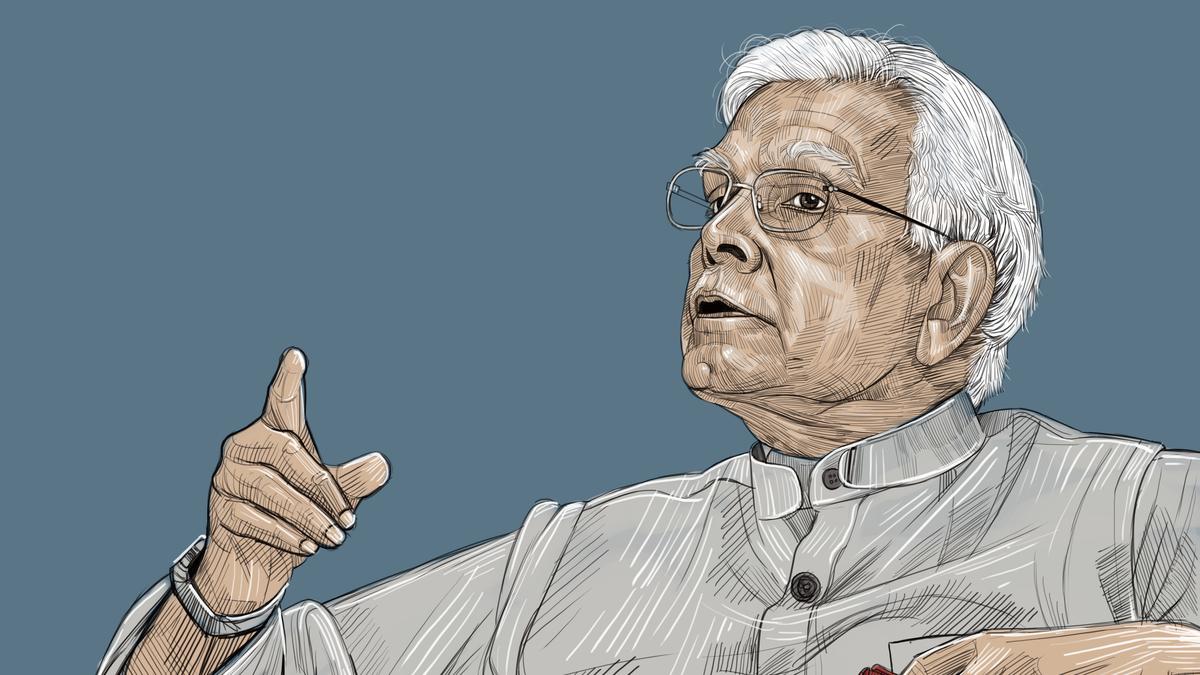
Natwar Singh
| Photo Credit: Illustration: R. Rajesh
Natwar returned to his favourite place, his farmhouse outside Delhi, for one last time on August 10. It was here that he had summoned me in the summer of 2011. At the end of our conversation, he reached out to his magnificent collection of books and gifted me a copy of A Bunch of Old Letters, one of the last books by Jawaharlal Nehru. The letters gave a glimpse of Nehru’s career as well as the world that greeted K. Natwar Singh as he started a career that would span the prime ministerships of Nehru, Indira Gandhi, Rajiv Gandhi, and Manmohan Singh. Letters helped him remember the past.
Last year, he recollected his first and only meeting with Mahatma Gandhi. His father, one of the three Nazims of Bharatpur, was not fond of the leader. Bharatpur’s royal house was one of the several princely states that were intimidated by the Mahatma. News had spread, and thousands of people had gathered at the train station to get a glimpse of Gandhi. Natwar said that perhaps as a polite gesture to the sentiment of the princely state, Gandhi declined to step out of the railway compartment and stayed inside.
Teenaged Natwar was determined to speak to Bapu and zigzagged within the crowd. Not to be disappointed, he jumped onto the track, went to the other side of the compartment, grabbed the edge of the window, and pulled himself up. Once there, he could see Gandhiji, bent over and reading. A sea of humanity had surrounded the train, but that did not disturb the Mahatma who appeared serene. Natwar looked at the Mahatma but did not get any response as he was in the middle of one of his many silent penances.
Natwar first narrated this story over a phone call and then during our next meeting. As the story came to depicting how Gandhiji was seated, Natwar shrunk his shoulders draped in a white shawl to show the exact posture. As he narrated, he painted a vivid picture with his words and body language — of the environment on the railway platform, the crowd, young Natwar and even his restless father at home looking for his son who, despite his disapproval, had decorated his room with photos of the leaders of the nationalist movement. Such was the power of narration and memory that Natwar possessed.
I once asked him about the trick behind it. He was quick with the answer: “We did not have all these gadgets that you have. Whatever we read had to be memorised. There was no other way.”
A man of strong ideals
Like many of the figures of Natwar’s growing up years, he too became a figure who found space on newspaper pages. Long before our tea time talks became a monthly feature, I was introduced to him through these pages. He was a minister of state for external affairs in my childhood. His ministerial stint came to an end with the end of the Rajiv Gandhi government in 1989. During the P.V. Narasimha Rao years, he was in partial political exile as Rao and he did not see eye to eye. Natwar was a Nehruvian and too much of a non-alignment oriented figure. He launched the Indira Congress with N.D. Tiwari.
In 2005, I was with The Week magazine and Natwar was again in the news. He was the external affairs minister and was being accused of being a beneficiary of the oil-for-food payments that was rocking the western headlines. He gave a brief telephonic interview. A few days later, his secretary called me to a meeting with the minister. Natwar arrived dressed in a spotless white kurta pajama. Our meetings continued even after he quit the cabinet post on December 6, 2005. Each meeting would include cups of tea and sometimes, a meeting would turn into a round table with a few other guests and his wife Heminder Kumari Singh joining in.
He turned 90 as the world trembled during the pandemic. Natwar’s hands had also started trembling, I noticed for the first time. Slowly, his daily meetings reduced but he kept me on the list of visitors. Our monthly conversations sometimes would become weekly as he would seek suggestions on what should be done to improve his health. With hospital visits increasing, his public appearances reduced though he continued to meet close friends at home. This May, he turned 95.
Ever the gentleman
For the last nearly five years, he kept insisting that my new book, which covers the first batches of the Indian Foreign Service (IFS) officials, should be completed as soon as possible. I started working on it after Natwar had shared with me the first official directory of the IFS published in 1959. He was one of the officials featured in it. I informed him of that. He responded with an impish smile, “I hope you are writing nice things about me.”
From October to December 2023, most of our meetings and phone calls would be focused on the book. Finally, when Nehru’s First Recruits: The Diplomats Who Built Independent India’s Foreign Policy arrived this summer, I brought a copy to him. His assistants made him sit on the bed as he thumbed through it. He was thrilled. “I am happy for you,” he said smiling. Perhaps it was the last book that Natwar received in a lifetime enriched with events, friends and books.
It was the last time we met. This time, apart from the country, books, and the government, he also mentioned how a friend had passed away without suffering much. I left knowing that Natwar kept his share of secrets and then too he was hinting at something that he alone knew.
#Natwar #Singh #Nehruvian #memorist #friend






